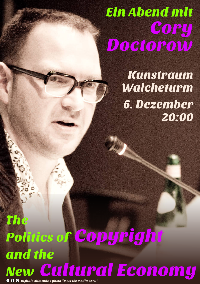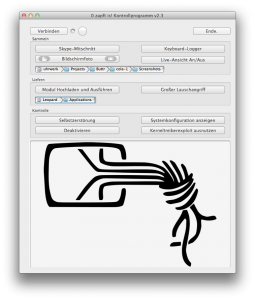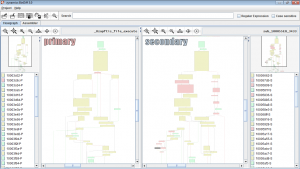Chaos Computer Club analyses newer version of the “Staatstrojaner”
(English translation of the original german version)
Lately the Chaos Computer Club (CCC) has recently received a newer version of the “Staatstrojaner”. The comparison with the older version, already analysed by the CCC with the actual Sniffer-code from December 2010, revealed new evidence. Despite the claims of the responsible parties, the trojan can still be captured, loaded with any code and also the allegedly “audit trail” can be manipulated. The CCC is calling for a complete waiver of Trojans in pre-trial applications.
On October 8th 2011, the CCC published the documentation and binary data regarding a german “Staatstrojaner”. [0] This was used for the officially called computer infiltrations, trivially called “source-telecommunication surveillance”. Its application in pre-trials and law enforcement meanwhile was admitted by many states.
Despite the CCC has published solid technical evidence, the authorities responsible for internal affairs, as well as the manufacturer DigiTask, denied the existence of any illegal functionalities [1],[2],[10], and pleaded that the analysed Trojan was allegedly an outdated software version.
The excuses vary from “trial” to “prototype”, DigiTask still insisted on October 11th 2011 to its governmental customers, that almost all problems are being solved in newer versions. The manufacturer DigiTask and the authorities view the functionality of code-reloading as a “natural need”, for which the implication of fundamental rights violation is relative in any way. It serves a purpose, and therefore the aim justifies the means.
Therefore, the CCC now presents a more detailed technical documentation of a newer version of the “Staatstrojaner” from the year 2010.[3] The testimony of DigiTask[11] is the basis of a detailed report that serves as a euphemistic attempt to conceal its illegal nature. At the same time, both disassembled versions of the Trojan, commented by the CCC, were made publicly available in order to ensure the traceability of the findings and to facilitate further research by interested parties. [4]
„Even during the last three years, the authorities and their providers were clearly not capable of developing a “Staatstrojaner” ehich would meet the minimum of requirements for juridical evidence, basic law compliance and security against manipulation”, a CCC spokesman summed up about the new findings. “By these concrete and principal reasons, it is logical not to expected that this would succeed in the future.”
The diagnosis of the new CCC report presents a strong contrast to the claims by the Interior Secretary Ole Schröder, who was the one who apparently had drawn the short straw and be the one to justify and answer questions of the parliament. There, he claimed: “The software is designed for each individual case and previously checked, so that it can’t do more than it is allowed to.” [8] Under the previously mentioned conditions, it is evident that the test wasn’t very intense – how could it, without available source code.
[0] The first press release regarding the “Staatstrojaner”
[1] http://netzpolitik.org/wp-upload/174366-Bericht-BKA-Prasident-Ziercke_TOP-24a-24c_53.-InnenA-Sitzug.pdf
[2] http://www.bundestag.de/dokumente/protokolle/plenarprotokolle/17132.pdf
[3] Technical report
[4] commented disassemblance of both versions of the trojan and here both binaries
[5] Videos: http://haha.kaputte.li/0zapftis-2_lowres-final.mov
http://haha.kaputte.li/0zapftis-2_922x578-final.mov (medium resolution)
http://haha.kaputte.li/0zapftis-2_1230x770-final.mov (high resolution)
[6] Frank Braun: „0zapftis – (Un)Zulässigkeit von ,Staatstrojanern‘“. In: Kommunikation & Recht 11/2011, S. 681-686
[7] FAQ zum Staatstrojaner
[8] Plenarprotokoll 17/132 des Deutschen Bundestages, 19. Oktober 2011, S. 15604,
[9] Ulf Buermeyer, Matthias Bäcker: Zur Rechtswidrigkeit der Quellen-Telekommunikationsüberwachung auf Grundlage des § 100a StPO, HRRS
[10] Dem CCC zugespielte Stellungnahme der Firma DigiTask an ihre Behördenkunden
Person to Person
Thank you, Wim Wenders. – You just unblocked the frog, which was stuck in my throat.
In his short film, focusing on the aims of the “Millenium Goals”, the yet unspoken message is clear: “We don’t need the governments”. – Correct! One has to act himself.
Keep the promise. – Act now. Person to Person.
Direct Link to video file
Music = A Label?
A response to an article in Wire and Woz (Swiss Newspapers Translation into German) from Chris Cutler on Kenneth Goldsmith about his epiphanies on filesharing
I admit, I am not very musical, I don’t play an instrument at the moment, I like classical and electronic music. So writing about music here seems odd. However I think the before mentioned articles are anything but about music. Let me explain.
Chris Cutler has two views on his statements against filesharing and uploading of music: One from The Artist and one from The Label and that might be part of the problem. Where there has been an increasing numbers of radios and studios and music that has been recorded in a studio, studio-music might not be everything what human beings are capable of doing in music.
Of course if you see the world of music circling around its production in studios and by artists which produce records in one of them, the consumer might be as marginal as to be reduced to a consumer (actually a perspective the author Chris Cutler wants to write against). However if you think music not only makes sense on the production in a studio side but also on the listener and the reproducers side, you might fling open other doors on the view about music. Read more…
Upcoming event: “The Politics of Copyright and the New Cultural Economy”
 On 6th of December 2011 2000h CET (1900h UTC) Cory Doctorow is going to have a talk on “The Politics of Copyright and the New Cultural Economy” at “Kunstraum Walcheturm” in Zurich.
On 6th of December 2011 2000h CET (1900h UTC) Cory Doctorow is going to have a talk on “The Politics of Copyright and the New Cultural Economy” at “Kunstraum Walcheturm” in Zurich.
“Der Kanadische Science Fiction Autor und politische Aktivist Cory Doctorow wird über die Politik des Urheberrechts und seine Erfahrungen mit der freien Kultur sprechen.”
Richard Stallman’s talk at ETHZ
 This evening Richard Stallman was giving a talk at the ETHZ. It was nice to see how the lecture hall was filled with young ICT students and hackers. Richard started his talk by saying that if anybody wants to record the talk or take pictures should publish it only by using free formats, such as ogg. – Well he’s substantially right by saying this. I was just wondering why it has to be said, as I think it’s self-evident.
This evening Richard Stallman was giving a talk at the ETHZ. It was nice to see how the lecture hall was filled with young ICT students and hackers. Richard started his talk by saying that if anybody wants to record the talk or take pictures should publish it only by using free formats, such as ogg. – Well he’s substantially right by saying this. I was just wondering why it has to be said, as I think it’s self-evident.
It appears that even one of the most respected education institutes, such as the ETHZ, does not take Freedom for granted. And there lies the socio-political deception: Governments and regulation authorities have pushed surveillance and media control as far as we’re accepting debates about freedom to be discussed in mediocre circles. People using GNU/Linux are seen as outcast, rebels and extremists. – Though freedom ought to be one of the most basic principles of humankind!
There’s a massive lack of intellectuals and authors, interfering into the public political and cultural debates, as it has become difficult to avoid the mass media and, – therefore, – disinformation. The economical thirst for growth managed to incorporate writers and readers to subordinate their belief for the sake of media-control. Academics and brains subordinated with self-absorbed researches, funded by lobbyists and obscure organisations, to abandon their principles of liberty and freedom.
At the shift from information society to knowledge society, it’s not enough to just present the four freedoms of Free Software to the tomorrows system administrators and technoly adepts. Richard might be substantially right in his exposure of the principles of free software, while “Big Brother“, – as he calls it, – has ever since found new means of control. (Which are implemented into the todays information technology structures, without letting users know. Whereafter a large part of society argues “I’ve nothing to hide”!)
Richard seems to have become “commensurable” to a large audience, without being contradicted, without disruptive moments and “Etat de Siege“, which are needed to shake the public. – Literally!
Humankind has to understand that the dialectic rapidly has to change and that we’re not willing to be instrumentalised by capitalism. Culture is defined by self-determination, innovation, transparency, freedom and human rights. Richard, the whole free software and civil liberty society have to take the step to the next level and start to take back, 0wn and rule this planet!
[Update]
Politischer Paradigmenwechsel
 Sozialpolitisch ist das ja sehr interessant, dass Piratenparteien und Autonome den Staat an das Recht und die Verfassung erinnern müssen!
Sozialpolitisch ist das ja sehr interessant, dass Piratenparteien und Autonome den Staat an das Recht und die Verfassung erinnern müssen!
Im Klartext muss die Rede lauten:
Entspricht der “Staatstrojaner” den technischen Einschränkungen, welche vom Bundesverfassungsgericht vorgegeben wurden und wer trägt die Verantwortung dafür? Sind diese Einschränkungen in leicht oder grob fahrlässiger Weise übertreten worden und falls ja muss die Instanz, welche dafür haftet, zur ganzheitlichen Verantwortung gezogen werden.
Minister müssen zurücktreten, Regierungen ersetzt werden.
[Update 16. Oktober 2011]
Christopher Lauer schreibt “Überwachung unverzüglich stoppen, Quellcode offenlegen”
Christian Sickendieck schreibt “Der Verfassungsbruchminister”
CVE-2011-3230
Blackboards in Pr0n
 Watch the image closely. – No! Not the stockings, stupid! THE BLACKBOARD!
Watch the image closely. – No! Not the stockings, stupid! THE BLACKBOARD!
Trigonometry in Pr0n:
Compound Angle Formulaesin (A + B)
= sin A cos B + cos A sin Bcos (A + B)
= cos A cos B - sin A sin Btan (A + B)
= tan A + tan B
1 - Tan A Tan B
The blog “Blackboards in Porn” is just hilarious!
Working with Linux
I”ve been now several weeks immersed in my sea of Linux and everything was running smoothly until I encountered my first conundrum: can I actually work with it? From what I’ve read, this seems to be the key issue holding people from closing their Windows forever. “Personally the lack of certain pieces of commercial software on Linux is the reason I still keep a copy of Windows”. So I started off skeptical about the actual possibilities of operating “more complex” software on Linux. Sure there are plenty of free solutions, but are they enough developed yet? Or are we enough developed yet to use these and understand the importance of contributing to the growth of the free software movement? If you answered both this questions with a “not yet”, like I did, then don’t worry cause is not all lost. You can still get the programs you need/love/are used to on Linux. Me, I can’t live in a photoshopless environment. Which is why I started trying to figure out a workaround for it (Note: if there’s something any average computer user like me should be certain of, is that when it comes to computers, there’s always a way of tweaking things for satisfying our needs (unlike with people). Having this in mind, I just refused to accept that if I’m on Linux, I just can’t have Photoshop. So after understanding what Wine is, how it works and how it’s to be used, I could finally get PSCS5 to work (although if you are running on a 64-bit Linux environment, I suggest you to read this). It wasn’t difficult to get it and now I have that feeling of really owning my computer, as I need it to be. And yet not having to return to the notion of enduring Windows weaknesses only because “better the devil you know”.
I would like to finish this post by reflecting upon a quote from one of Adobe’s employees when asked about a commercial release of Adobe for Linux users. He writes: “Linux is not a single OS, but a kernel used in many fragmented OSes with few standards.” These are the kind of opinions that give people the feeling that high quality or high value can only happen on a commercial environment. I couldn’t disagree more with it, and hopefully more people will soon realize how superficial this thinking is. But don’t take someone’s word for it, you need to try it yourself.

